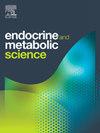甲状腺疾病患者贫血的患病率和时间趋势:1999-2018 Nhanes
Q3 Medicine
引用次数: 0
摘要
背景贫血和甲状腺疾病都是普遍存在的健康问题,这两种疾病常常同时存在,而且很容易被忽视,共同给社会造成了巨大负担。本研究专门调查了美国人群中甲状腺疾病患者贫血的患病率和时间趋势,揭示了公共卫生中的一个关键交叉点。方法本研究利用 10 个调查周期(1999-2018 年)的国家健康与营养调查数据,纳入了年龄在 20-85 岁之间、自我报告确诊患有甲状腺疾病的参与者。贫血的定义以女性 12 g/dL 和男性 13 g/dL 为临界值。通过卡方检验比较了不同类别和调查周期的患病率。结果所有甲状腺疾病患者的血红蛋白中位数为 13.6 g/dL。美国甲状腺疾病患者贫血的总患病率为 12.00 %(95 % CI:10.96-13.09)。值得注意的是,1999-2008年(9.58%,95% CI:8.14-11.18)和2009-2018年(13.68%,95% CI:12.26-15.21)期间,甲状腺疾病患者的贫血患病率呈上升趋势。女性(9.05 %,95 % CI:8.14-10.02)、老年人群(7.98 %,95 % CI:7.12-8.91)、独居者(5.96 %,95 % CI:5.21-6.77)、体重指数高者(5.结论美国甲状腺疾病患者的贫血患病率为 12%,表明在过去几十年中贫血患病率有所上升。本文章由计算机程序翻译,如有差异,请以英文原文为准。
Prevalence and temporal trends of anemia in patients with thyroid disease: 1999–2018 NHANES
Background
Anemia and thyroid disease, both prevalent health conditions, often co-occur and may be easily overlooked, collectively imposing a significant burden on society. This study specifically investigated the prevalence and temporal trends of anemia among individuals with thyroid disease in the US population, shedding light on a critical intersection in public health.
Methods
Utilizing National Health and Nutrition Examination data from 10 survey cycles (1999–2018), this study included participants aged 20–85 years who self-reported a diagnosis of thyroid disease. Anemia was defined with a cutoff of 12 g/dL for women and 13 g/dL for men. The chi-square test compared prevalence across different categories and survey cycles. Data analysis employed R 4.3.2, with P < 0.05 considered statistically significant.
Results
The median hemoglobin level among all individuals with thyroid disease was 13.6 g/dL. The overall prevalence of anemia among the US thyroid disease patients was 12.00 % (95 % CI: 10.96–13.09). A noteworthy upward trend in the prevalence of anemia among thyroid disease patients occurred during 1999–2008 (9.58 %, 95 % CI: 8.14–11.18) and 2009–2018 (13.68 %, 95 % CI: 12.26–15.21). Anemia incidence in individuals with thyroid disease was higher in females (9.05 %, 95 % CI: 8.14–10.02), the elderly population (7.98 %, 95 % CI: 7.12–8.91), individuals living alone (5.96 %, 95 % CI: 5.21–6.77), those with high body mass index (5.38 %, 95 % CI: 4.67–6.17), and non-Hispanic Whites (5.33 %, 95 % CI: 4.62–6.11).
Conclusions
The prevalence of anemia in the US population with thyroid disease was 12 %, indicating an increase over the past few decades.
求助全文
通过发布文献求助,成功后即可免费获取论文全文。
去求助
来源期刊

Endocrine and Metabolic Science
Medicine-Endocrinology, Diabetes and Metabolism
CiteScore
2.80
自引率
0.00%
发文量
4
审稿时长
84 days
 求助内容:
求助内容: 应助结果提醒方式:
应助结果提醒方式:


